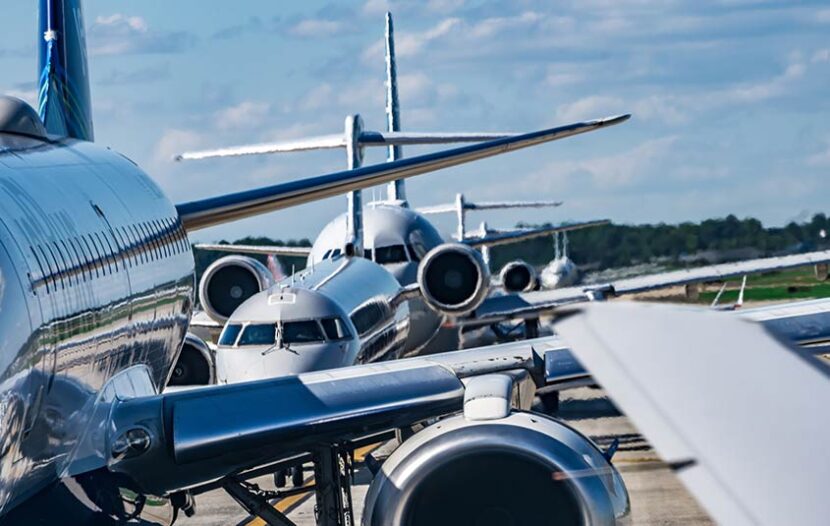OTTAWA — The federal government has issued its latest update on measures aimed at reducing congestion at Canada’s biggest airports, as well as ease bottlenecks at passport offices.
From the looks of things, the need for action is more critical than ever, after Canada took an unenviable first place for delays for airlines and airports over this past July long weekend, according to one flight tracking service.
The news also comes as the first full week of the high season summer months gets underway, and as travellers across the country, including families flying for the first time in more than two years, look forward to their first trip in more than two years.
On June 30 Air Canada announced “meaningful reductions” to its flight schedule for July and August in an effort to reduce passenger volumes. The move takes some 9,500 flights out of Air Canada’s domestic and transborder schedule this month and next.
Transport Minister Omar Alghabra is meeting this week with Air Canada CEO Michael Rousseau, after more meetings with WestJet and the GTAA last week. The goal: to get aligned on all actions, current and planned, from the airlines and the industry to onboard more staff and streamline operations, as the number of travellers will only go up.
ARRIVECAN PROCESS UPDATES
The steps taken by the government in recent weeks include updates to the ArriveCAN process.
Travellers arriving at Toronto Pearson or Vancouver Airport can potentially save time by using the Advance Canada Border Services Agency (CBSA) Declaration optional feature in ArriveCAN to submit their customs and immigration declaration in advance of arrival. As of June 28, this option was available on the ArriveCAN mobile app in addition to the web version. This feature will be expanded to other airports in the future, including Montréal-Trudeau International Airport this summer.
Frequent travellers are encouraged to take advantage of the ‘saved traveller’ feature in ArriveCAN, allowing users to save travel documents and proof of vaccination information to reuse on future trips. The information is pre-populated in ArriveCAN the next time the traveller completes a submission.
Travellers now receive a digital handout explaining their entry and post-border requirements based on their ArriveCAN submission so they have quick access to the latest health and travel measures information.
Meanwhile Transport Canada has says additional obligations can now be imposed on airlines that have repeated cases of the same flight occurring with high levels of ArriveCAN non-compliance.
The government is also reiterating that since April 2022, more than 1,000 Canadian Air Transport Security Authority (CATSA) screening officers have been hired across Canada. The number of screening officers at Pearson and Vancouver Airport is now over 100 % of the targeted requirements for this summer “based on projected traffic”, says the government.
Mandatory random COVID-19 testing will remain temporarily suspended at all airports, for travellers who qualify as fully vaccinated, until mid-July, when the random testing will return, and tests will be completed outside of the airports
“The actions we’ve taken since the beginning of May have yielded significant gains. From June 20 to 29, across all larger airports combined, CATSA reported nearly 85% of passengers being screened in 15 minutes or less,” says a statement from Minister Alghabra and others.
“We are making progress, but challenges remain, particularly for travellers facing flight cancellations and issues with baggage services. We continue to take action with air industry partners to reduce the delays in the travel system and update Canadians on our progress.”
TOP SPOTS IN FLIGHT DELAYS
According to tracking service FlightAware, Canadian airlines and airports claimed top spots in flight delays over this past July long weekend, notching more than nearly any other around the world.
Air Canada ranked number one in delays on Saturday and Sunday that affected 700+ trips in total, or about two-thirds of its flights, while WestJet and Swoop placed third and fourth for delays on Saturday. Toronto’s Pearson airport claimed the No. 2 spot Sunday below China’s Guangzhou airport while Montreal placed sixth.
PASSPORT DELAYS
The other major source of headaches for travel these days – passport turnarounds – has an update as well.
Service Canada says it is implementing new triage measures with the goal of providing a more intensive, client-specific approach.
In recent months images of interminably long lineups and multi-day waits outside passport offices have become the norm particularly in Vancouver, Toronto and Montreal, as travellers rush to renew long-dormant passports after two years of the pandemic.
In the Greater Toronto Area, the triage is separated into three groups:
- Travel within 24 to 48 hours
- Travel within 3 to 19 days
- Travel beyond 20 days (or with no specific travel date)
For travel within 48 hours, clients arriving or on site at any of these locations receive a ticket with an approximate window of time to return for service at these specialized passport sites. Proof of travel or need is required. For travel within three to 19 days, clients arriving or on site are being directed to specific nearby Service Canada Centres, with appointments. Again, proof of travel or need is required.
Approximate wait times for in-person service at specialized passport sites are available on Canada.ca.
Service Canada says: “Due to the current backlog, clients may be asked to resubmit photos and original documentation to get faster service. If selecting in-person service without an appointment, clients should have all the required documentation for a passport application ready to either renew a passport, or apply for a new passport for an adult or a child.”
The uptick in demand is clear from these stats from Service Canada …
Between April 1, 2020, and March 31, 2021, when travel was all but shut down, Service Canada issued 363,000 passports
Between April 1, 2021, and March 31, 2022, Service Canada issued 1,273,000 passports
Since April 1, 2022, Service Canada has issued 456,000 passports.
The total forecast for passports in 2022–23 is 3.6 million to 4.3 million applications.
With file from The Canadian Press

